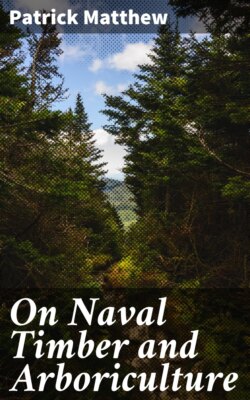Читать книгу On Naval Timber and Arboriculture - Patrick Matthew - Страница 11
На сайте Литреса книга снята с продажи.
BEECH-TREE—Fagus sylvatica.
ОглавлениеTable of Contents
This hardy tree occupies fully as wide a range, both of soil and climate, as the oak, and is generally the fastest growing, most vigorous of all our hard-wood kinds, prospering on all soils, on the dry and moist, the aluminous, the calcareous, the siliceous, provided water does not stagnate. It combines magnificence with beauty, being at once the Hercules and Adonis of our Sylva. The timber of our beech, while green, is by far the hardest of our large growing trees, and, in the American forest, the members of the beechen family match better than those of any other, with the perseverance of the ruthless Yankee; the roots retaining the hardness deeper in the earth than those of any other tree, and being so plaited and netted throughout the ground for a considerable space around the bulb, that it is next to impossible to trench or dig over the soil till they have decayed.
As we have before stated, the timber of the beech-tree soon corrupts if it is not speedily dried, or kept in water after being cut down, and is equally liable to corruption in the tree when deprived of life by wounds or other injury. Beech has a matured and sap wood, although they are not very distinguishable, being nearly of one colour. The former has {49} considerable durability when kept dry, the latter is speedily consumed by worming.
The planter of beech should procure the kind10 with yellow-coloured wood, termed by joiners Yellow Beech, in opposition to the kind with white wood, called White Beech. The yellow grows faster and straighter, and is cleaner and freer of black knots, and also more pleasantly worked than the white, but it corrupts much sooner in the bark when cut down. This variety of beech, when properly trained, is probably the most profitable hard-wood that we can raise; when planked, it bends pleasantly under the shipwright to the curvature of the vessel’s side. The tree is also much superior in size and grace of outline to the white. There are few planters who need be put in mind that beech of small size, or of short or crooked stem, is the least valuable of all timber. Whoever plants with a view to profit will, therefore, throw in only as many beech plants as may ultimately be required for standards, and these in the bosom of plantations; as it is seldom that beech attains to much value in hedge-row or on the outskirts of woods, {50} from its proneness when so situated to ramify and grow crooked. It is, however, quite possible, with a little early attention, to rear beech as straight and clean as to be valuable, on the outskirts, where it forms a beautiful fringe to the plantation, and affords excellent shelter.
